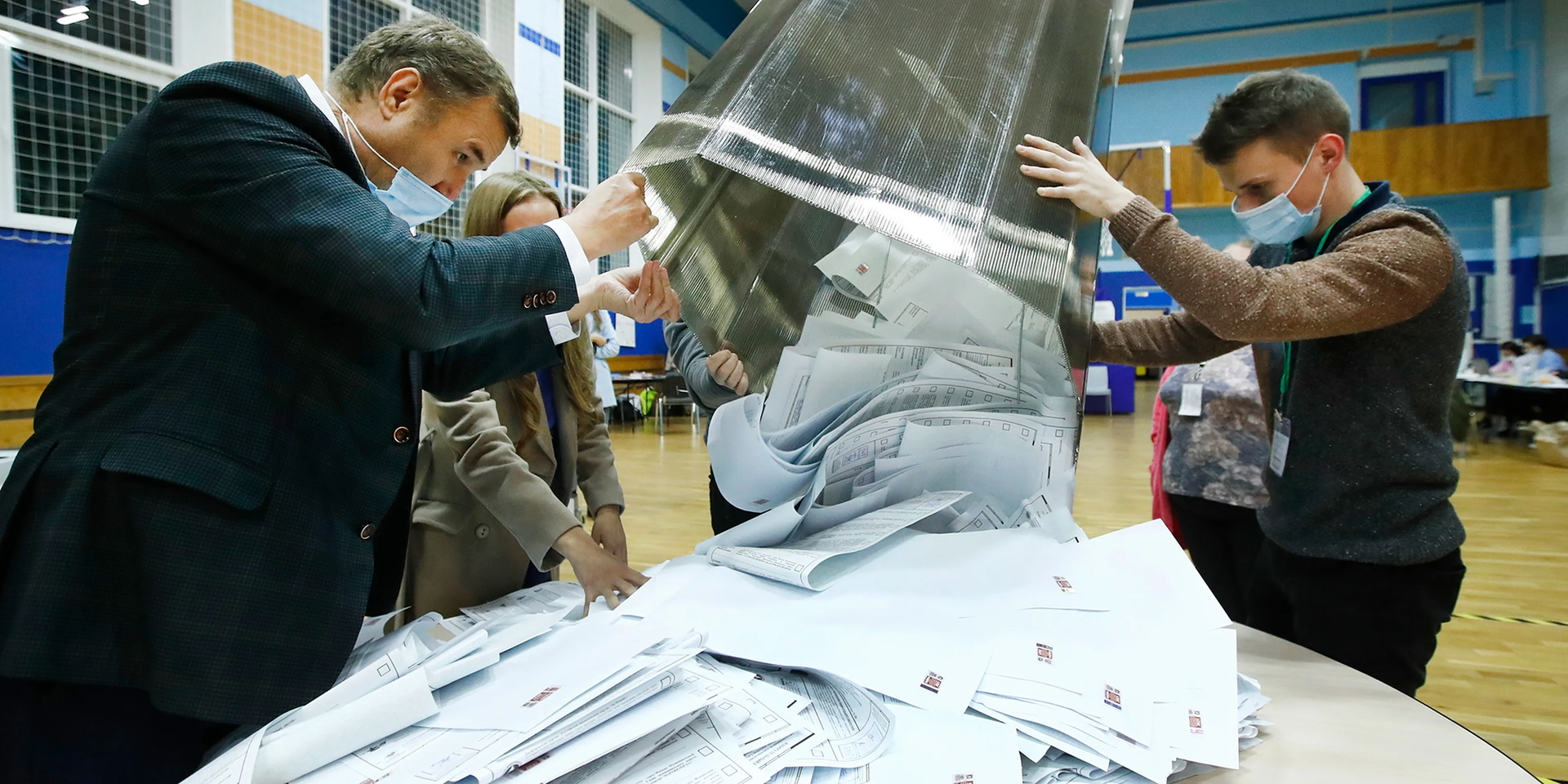Electronic Ballots of Pamfilova Sharpened “Churov’s Saw”
On the charts and laws of mathematics we explain why the results of the Duma elections could have been falsified

In Russia, on September 19, the first three-day elections to the State Duma ended. As a result of the ballots, United Russia won 324 seats in the lower house of parliament, the Communist Party of the Russian Federation — 57, LDPR — 21, SR — 27 and Noviye Ludi — 13. At the same time, many candidates from opposition could not participate in the elections: most of them were denied by the Central Election Commission (CEC) because of the “flaws” in the quality of voter’s signatures, as well as because of ties with the Anti-Corruption Foundation or the headquarters of politician Alexei Navalny (in June they were recognized as extremist organizations, and since May, people who were or collaborated with extremist organizations are prohibited to participate in the elections — Ed.note).
Then Navalny's team urged their supporters to vote for candidates from the Smart Voting list — those who are not associated with United Russia
For the first time this year, elections lasted for three days instead of one. Representatives of the Golos movement (included in the list of foreign agents. — Ed.note), those who monitor violations at the elections, noted that such a mode of work exhausts members of election commissions and observers: by the end of the voting days they lose their vigilance. In addition, among the observers this time there were more employees of the budgetary sphere or administrative agencies, they actually interfered with the observation. Also, “Golos” drew attention to the tough resistance to independent observers from members of election commissions, sometimes with the involvement of the police. The number of violations reported by observers has exceeded five thousand, follows from the “Golos” violations map.
For the first time in federal elections in seven regions — Moscow, Sevastopol, Nizhny Novgorod, Rostov, Yaroslavl, Murmansk and Kursk regions — it was possible to vote online. Golos noted that such a system of electronic voting and counting of votes is not transparent. Most of the questions arose about the results of the elections in Moscow. The results of electronic voting in other regions appeared on the evening of September 19, and in Moscow — only on the next day. Artem Kostyrko, Head of the Department for Improvement of Territorial Administration and Development of Smart Projects of the Moscow Government, explained the delay as follows: “When decrypting, we got a rather significant time delay relative to our expectations, this is due to the large number of transactions that we processed.”
However, after the announcement of the results of electronic ballots in all Moscow districts, where candidates from "Smart Voting" won by the results of in-person voting, the pro-government candidates celebrated the victory.
“Such a huge difference in the results of voting at 'in person' polling stations and online voting cannot be true. We can determine the reliability of counting at polling stations, because independent observers participate in it. But electronic voting is in its pure form a black box, which was deliberately hidden from us for more than 12 hours,” wrote candidate Mikhail Lobanov, who, after counting electronic votes, lost to United Russia’s, TV presenter of 'Russia 1' channel and Olga Skabeeva's husband Yevgeny Popov.
Saws, bells and comet tails
Despite the fact that the CEC did everything possible to make it difficult to access the voting data (officials entered a captcha on each page of the site with the data, and also transformed the data itself so that when copied from the site, the user received only a set of chaotic characters instead of understandable numbers. — Ed.note), Independent analysts and journalists were still able to collect and analyze them.
First of all, we paid attention to the turnout and the percentage of votes for this or that candidate. With the help of this data, suspicious abnormalities can be detected. The theoretical method for detecting election fraud is based on the fact that the significance of the turnout and voting results, like many processes in our world, are subject to certain mathematical laws. Just scroll down to see how it works.
How online voting changed everything
Electronic voting in Moscow got the most criticism from experts and electoral analysts. Its results were published much later than those from conventional sites. But most importantly, the results of the electronic voting changed the winners in eight of the 15 Moscow districts. When counting “paper” votes, candidates from “Smart Voting” were in the lead, and when online votes were added, Edinaya Rossia and pro-government self-nominated candidates took the lead.
Electoral analyst Sergei Shpilkin told Meduza (included in the list of foreign agents — Ed.note) that electronic voting “is an absolute evil — a black box that no one controls.” “I believe that electronic voting must die. Or it must be based on a different technology and with a different level of trust [to the organizer of the vote],” confident the analyst.
Scroll down to see on the charts how online voting influenced the election results in Moscow's single-member constituencies and other regions.